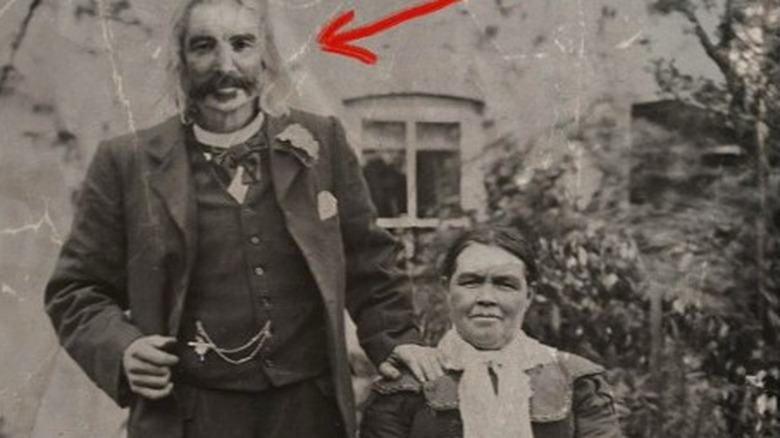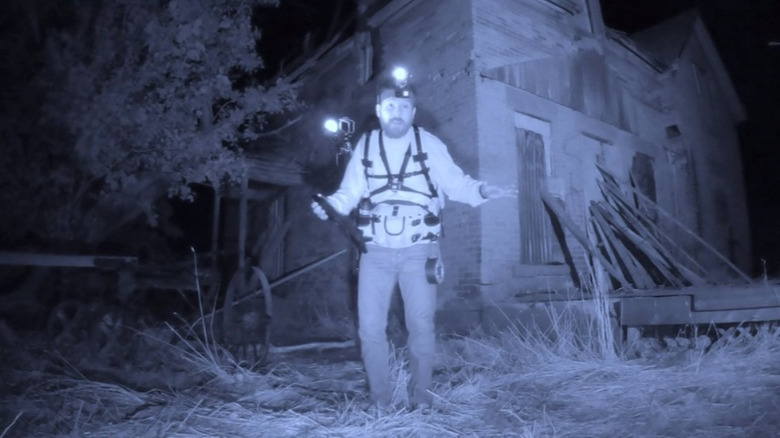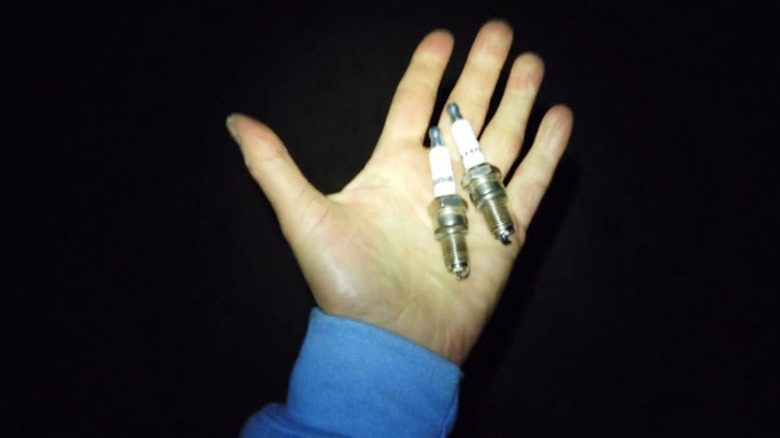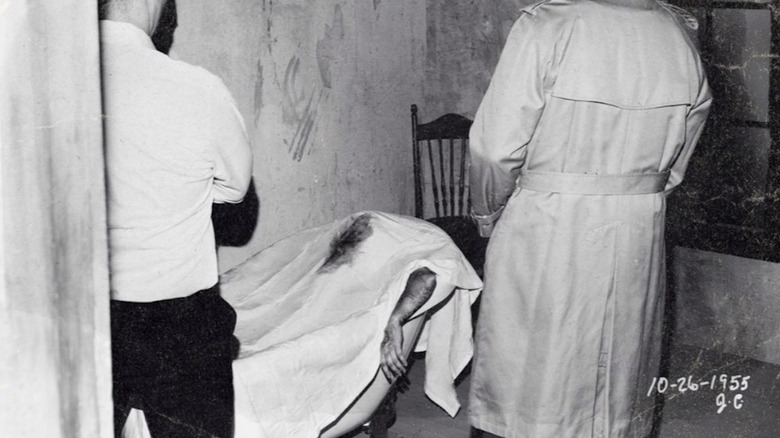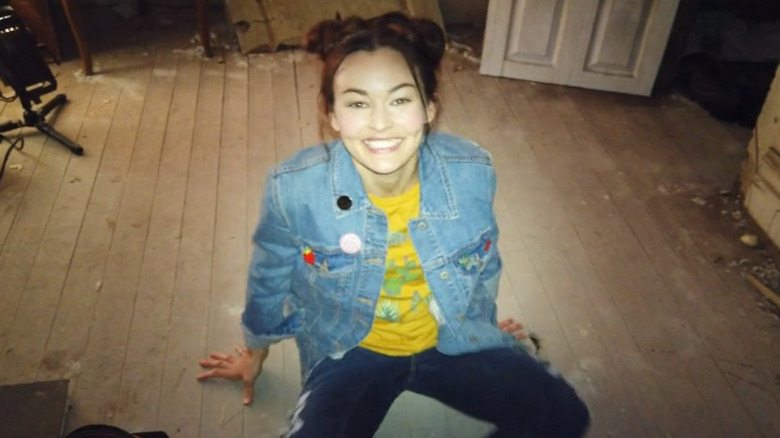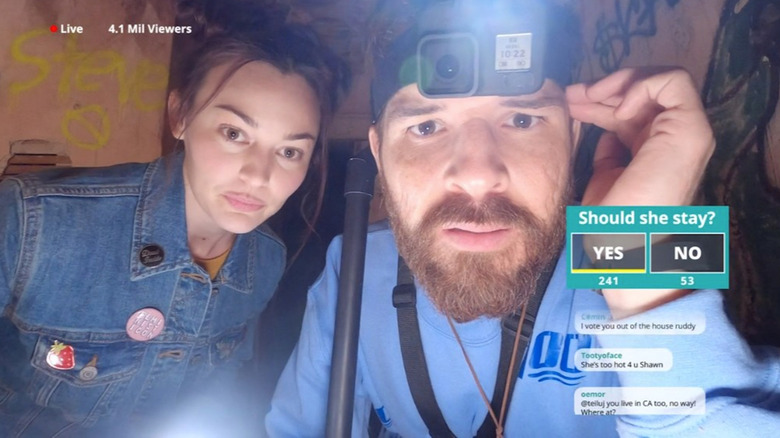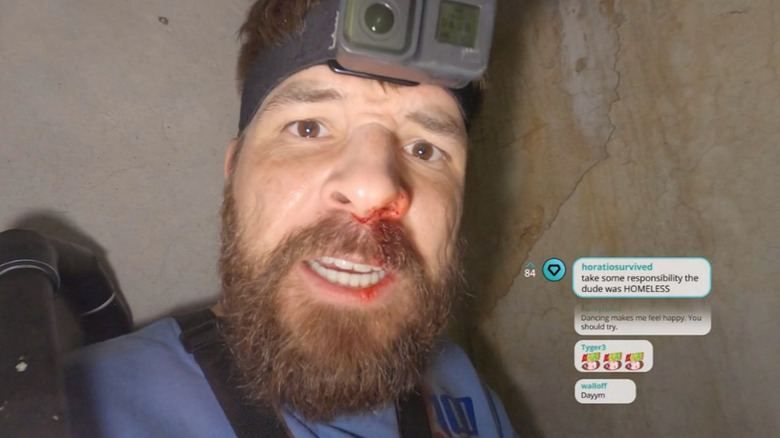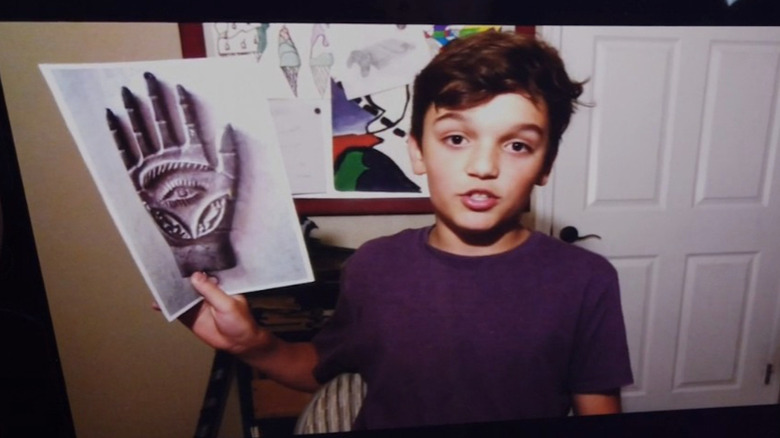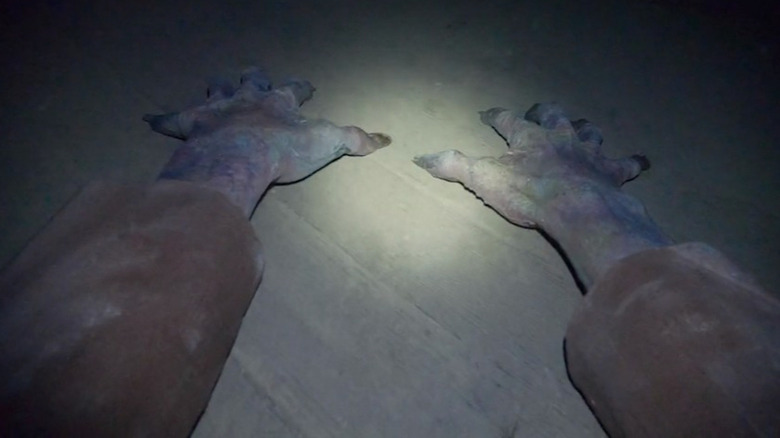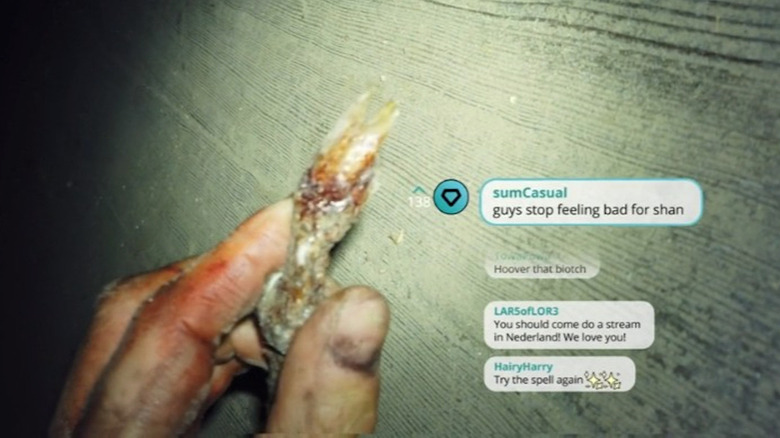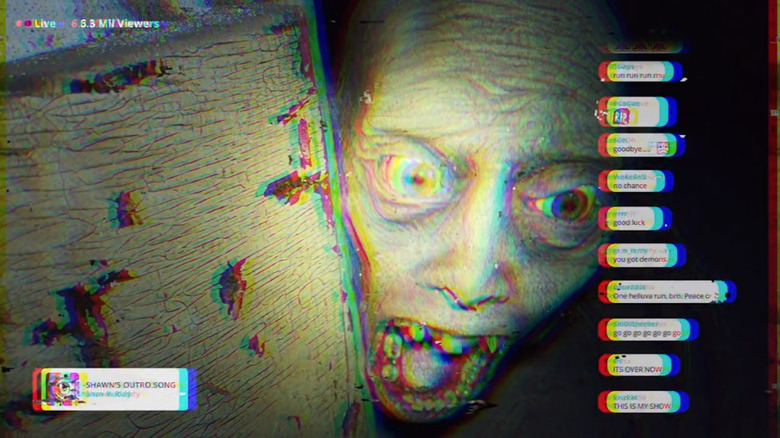The Ending Of Deadstream Explained
The found footage sub-genre of horror movies is one that provides myriad opportunities for nascent filmmakers to tell spooky stories on a modest budget. Though early examples like 1980's "Cannibal Holocaust" may have been a bit ahead of their time, the format was later popularized by the massively influential 1999 chiller "The Blair Witch Project." By the time you get to 2009's "Paranormal Activity," digital video cameras had become so affordable and accessible to a new generation of potential directors that it ushered in a new wave of inexpensive fright flicks.
In the modern era, audiences have become so inundated with would-be auteurs shaking their cell phone cameras in the direction of something vaguely sinister, that it can be difficult for newcomers to get much attention with it. Which makes it all the more impressive that the married directing duo Joseph and Vanessa Winter have managed to score so much acclaim with their debut ghost story, "Deadstream." The film currently sits at 91% on Rotten Tomatoes, with audiences and critics alike praising its B-movie charms. If you've already seen the film, you may be wondering just what was going on with that ending. Never fear, for that's exactly what we're here to discuss.
Wrath of Shawn
The film opens with a montage introducing us to the wild and crazy antics of online personality Shawn Ruddy (played by Joseph Winter), whose bread and butter appears to be putting himself in potentially perilous situations and freaking out the entire time for the entertainment of his loyal fanbase. Examples from the past include dog-sledding while almost naked, hiding in a bin that a garbage truck is currently collecting, and antagonizing cops so that they'll chase him.
This is an important early glimpse into Shawn's character, as it shows just how far he'll go for the sake of creating content, as well as blurring the line between his authentic reactions and pretending to be scared for the amusement of his audience. In an interview with SlashFilm, Winters described the creation of a character who appears to be unlikeable, and how they tried "to inject this character with some traits where you could actually believe that he has an audience, even if it's not you that wanted to watch this guy, there are believably people out there who really love him... I wanted to feel some sympathy with him in the sense that that's his thing, that's his job that he's putting everything into."
The Legend of Mildred Pratt
After Shawn gets "canceled" online due to actions that we won't learn about until later in the film, he doubles down on an epic live-streaming event that he hopes will win back his fanbase: spending the night in an actual haunted house. He decides on an abandoned and dilapidated site of several macabre deaths, which has come to earn the nickname Death Manor. As he sets up his cameras in various rooms, he regales his viewers with the legend of the house's previous occupant, Mildred Pratt.
A wealthy Mormon heiress whose father had built the house in 1880, Mildred wanted more than anything to be a great poet but was ultimately unsuccessful. She fell in love with a wealthy publisher named Lars Jorgensen and wrote two years' worth of letters to him before he proposed marriage. He tragically passed away before this could transpire, driving Mildred into a deep depression and causing her to hang herself from the top of the manor's staircase. This backstory is essential to understanding the events that Shawn inadvertently triggers, as well as the motivation behind the spirit that actively torments him throughout the film.
If you or anyone you know is having suicidal thoughts, please call the National Suicide Prevention Lifeline by dialing 988 or by calling 1-800-273-TALK (8255).
Rules of the night
In order to make the livestream as exciting as possible, Shawn knows that he'll have to fully engage with everything that the house has to offer. He manages to have the event sponsored by an energy drink company called Thunder, but the sponsorship is conditional: He is not allowed to leave the house, he has to explore every nook and cranny, and if there's any kind of activity or disturbance he has to go check it out. To spice things up even further, he has a wheel he can spin labeled "Stupid Things to Do," with available options including having to perform a séance or play with a spirit board.
One of the biggest challenges most horror movies face is finding a way to keep their characters motivated to stay where the danger is when most people would take one look at something scary and immediately head for the hills. "Deadstream" locks in Shawn's motivation to stay put early on: Thunder is the only one of his sponsors not to abandon him, and his desperation to keep his last one frequently overrides his fear of what he might find in the house. So time and time again, he goes to check out a strange sound or a potential ghost even though he'd probably rather stay hidden.
No way out
One caveat to his sponsorship deal is that Shawn is not allowed to leave the house — so either as a stunt to impress his fans or as a safeguard to prevent himself from turning chicken, he decides to take drastic measures to ensure that this rule is followed. Firstly, by removing the spark plugs from his car and throwing them into the woods, he won't be able to drive away when the going gets tough. Taking even further precautions, he then locks the front door and tosses the key down an underground vent, further limiting his options for escape.
A running theme of the film is that Shawn constantly manages to get in his own way and unwittingly sabotage himself, making him the architect of his own destruction. Once it becomes clear that the malevolent presence in the house is far more dangerous than any livestream can be worth, Shawn's attempts to run away are hindered by his own actions, as he finds great difficulty in relocating the discarded key and spark plugs. He is ultimately forced to jump out the window and break his own leg to get away from Mildred's ghost, which severely impacts his mobility going forward.
Previous victims
Mildred Pratt's death may be the first record of someone passing away in Death Manor, but it's far from the only one. As we learn from Shawn's narration and multimedia presentations, there have been a total of 11 additional deaths in the house since Mildred, before the house was eventually boarded up and declared uninhabitable in 1956. The first of these was a houseguest named Max Loland, who wrote diary entries describing a recurring dream involving a ghost who would stand in the corner and regularly mutter "the pond water is still."
In addition to this "Corner Man," who is later caught on video by one of Shawn's cameras, there were a number of other victims of the house, including several children in the nursery and a man drowned in a bathtub. These spirits were all slowly driven mad by Mildred before their deaths and now exist to haunt the house and do her bidding (one even takes on the appearance of a police officer before attacking Shawn). They all serve as a ghoulish warning about the fate that potentially awaits our hero if Mildred's ghost gets her way — not to mention playing a prominent role in the film's final moments.
Who is Chrissy?
After spinning his wheel of "Stupid Things to Do" and deciding to perform an impromptu séance with a creepy clown doll that he finds, Shawn hears some loud bangs in the house and retreats to his supposed safe room, hoping to keep any vengeful entities at bay. Rather than a ghost or ghoul, however, he is shocked to see that the noise was actually caused by a young woman named Chrissy, who claims to be a superfan of Shawn's and has come out to the house in the hopes of meeting him.
An uptick in viewers and a fan poll convince Shawn to allow Chrissy to be part of the stream, but something about her feels off. It's unclear how she got into the house after he locked the door, and she tricks him into performing a Latin ritual that appears to make matters worse. As it turns out, Chrissy is a modern-looking avatar for Mildred Pratt herself. While posing as a fan is a clever way to let Shawn's guard down, it also reflects Mildred's own desire for an audience of her own and foreshadows her goal of capturing not just Shawn's soul, but capitalizing on his viewership as well.
Influence of the chat
Throughout the film, Shawn regularly uses his tablet to check in with the chat room of viewers that are currently watching his livestream on the fictional Twitch equivalent Livvid. It's clear that he's both somewhat resentful of his audience, while also desperately craving their approval. He knows that this stunt could be a make-or-break moment for the future of his channel and his brand, so in addition to following the rules of his sponsorship contract, he often finds himself letting their whims determine what actions he takes next.
This active fanbase proves to be both a blessing and a curse, as the viewers occasionally dole out helpful advice about the meaning of certain symbols or how to use various tools at his disposal, but they also push him to keep Chrissy around (which has disastrous results) and, despite his constant brushes with potential violence, they mercilessly insist that he follow his own rules and threaten to abandon the stream. This results in Shawn having to regularly act against his own self-interest, highlighting the notion that he is as much a slave to his audience as he is to Mildred, valuing their positive reinforcement above his physical well-being.
Shawn's real crime
There is significance to the fact that the initial montage ends with the prank involving Shawn throwing rocks at police officers so that he can run away from him. The very next thing we learn about Shawn is that he has been publicly disgraced online for a stunt that went too far. The incident with the cops serves as a red herring since it's easy to imagine that such a stunt would have offended pro-police factions to the degree that he would get canceled.
It's not until later that we realized the real reason he was demonetized is that he paid a homeless man to fight him for a video and accidentally put him in the hospital. He had put out an insincere apology video and finds himself apologizing again once his situation feels a lot direr. Joseph Winter touched on this in a SlashFilm interview, observing that "a streamer or a YouTuber will have a controversy and... usually the apology video digs deeper and accidentally they start saying things or they start doing something that becomes more offensive and alienates more people." He added that they decided "we're not actually going to change this person to be a good person, but he thinks in his mind that he's a better person now."
Significance of the hamsa
As Shawn makes his way through the house, setting up GoPros everywhere and recounting the history of all the deaths that have taken place there, he notes that there's only one room in the house where there are no reports of anyone dying. Based on this, he decides to dub it his "safe room," making it his main HQ where he stores his equipment and monitors the rest of the house. By seeming coincidence, he sees in the closet a picture of what looks like a human hand with an eye in the palms. He later destroys this symbol in the hopes of antagonizing the ghosts or warding away their presence.
As it turns out, there is no coincidence. A young viewer sends Shawn a video explaining that the symbol is known as a hamsa, a religious image that is intended to provide protection and keep evil spirits away. By destroying it, Shawn has essentially invited Mildred and her kin into the mortal realm. It is also worth noting that the drawing we later see that Mildred used to perform her original ritual looks like an inverted version of the hamsa, since one is used to repel demons and the other invites them in.
Let's demonetize this ghost
One of the biggest twists in "Deadstream" occurs near the conclusion when Shawn discovers an incantation in Mildred's book of poetry that she had used to give herself satanic powers. Up until this point, he had been operating on the theory that the reason she was intent on trapping all these souls was so that she could create the family that she never was able to have in life. After looking at the incantation, and realizing that the phrase that the ghouls had been repeating ("the pond water is still") was actually an excerpt from her poetry, he comes to the conclusion that rather than collecting a family, Mildred has actually been collecting an audience for her writing.
In this way, Mildred serves as a dark reflection of Shawn himself. They are both willing to go to extreme lengths in order to build and maintain an audience for their art (being a poet and an influencer, respectively). This also inspires Shawn to use the incantation against her, weaponizing his own fanbase to cancel out her powers and send her back to Hell. Thus, the demonetization tool that put him in this predicament becomes the method of his salvation.
Sacrifice of flesh
After resolving to utilize Mildred's demonic spell against her, Shawn must track her down and recite the necessary passage. Her powers are great, and the two engage in a vicious fight for dominance involving a spear-mounted camera and an unfortunate bite to the crotch. Eventually, Shawn is able to get the upper hand long enough to recite the incantation, but inexplicably it does nothing. He drags himself away from her and comes across her petrified finger, which he had found in a lock box earlier. He realizes that the spell requires a sacrifice of flesh and that he must be willing to give of his body in order to defeat her.
This chain of events coincides with Shawn's own realization about the people that he's hurt, specifically the bum fight that got him canceled, and prompts him to give another, more sincere apology for coming up with the idea in the first place. The finger that he eventually chops off is representative of how words are not enough and that he needs to commit to what he says and follow through with action rather than just give an empty apology, or indeed recite an empty incantation that does nothing without the personal sacrifice that makes it meaningful.
New followers
Shawn's last-ditch attempt to defeat Mildred by reciting her own spell and chopping off his finger manages to pay off, as Mildred finds herself dragged underground to a blood-red realm that we can reasonably assume is Hell. Her curse is lifted, and Shawn has seemingly survived to tell the tale. He pulls up his monitor to see that his viewer count has increased dramatically and that the audience is congratulating him on making it through to the other side. It seems like all is well and the battle is won, but as with most horror movies, things don't often resolve so neatly.
Suddenly, Shawn finds himself surrounded by the previous victims of the house, and we realize that because of the incantation they have become his new followers, literally following him as he tries to crawl away toward the door, where another one is there to greet him before the camera goes black and the feed ends. Shawn's specific fate is left ambiguous, but if we're reading the film thematically, it hardly matters. Whether he escapes and goes back to making prank videos or is consumed by the house to take Mildred's place as its resident spirit, the conclusion is the same: He will always be at the mercy of his audience, which is the life he's chosen for himself through his actions.


